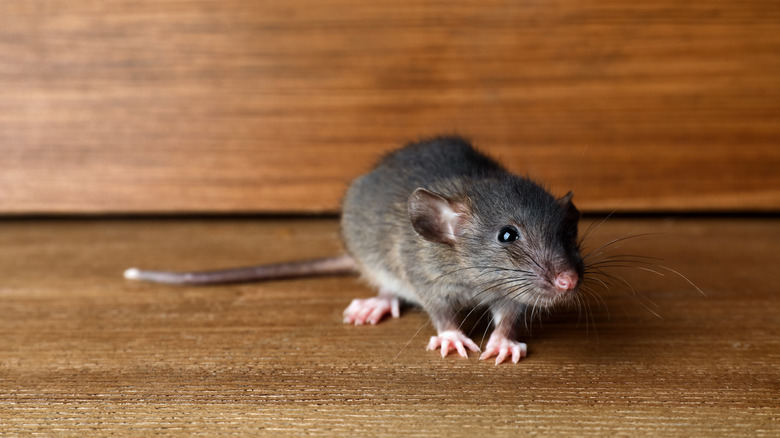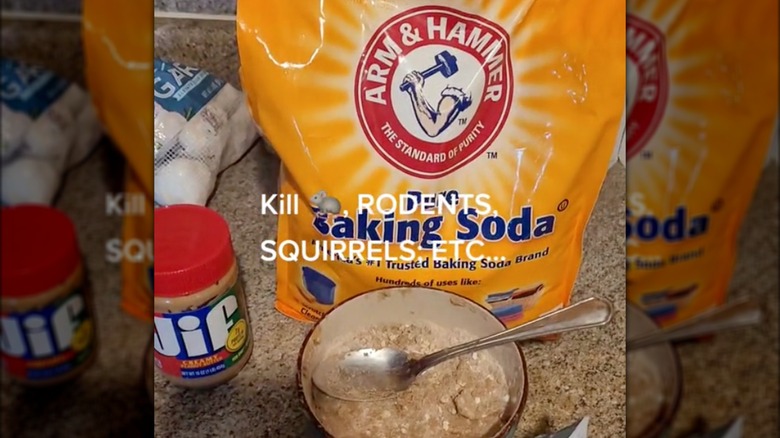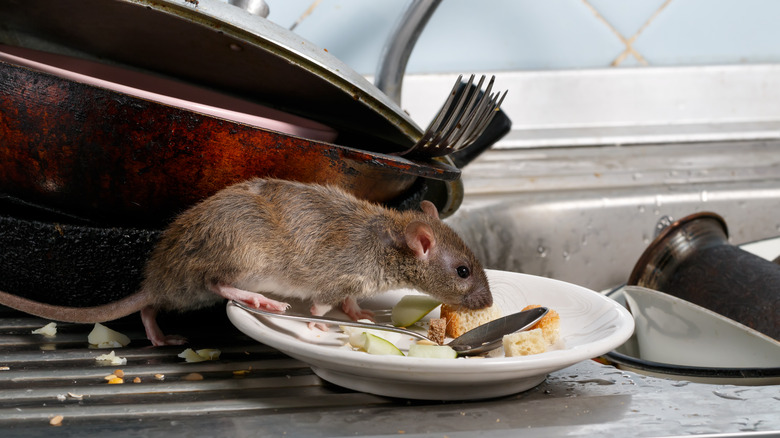The Baking Soda Hack People Use To Control A Rat Problem (& Does It Actually Work?)
We may receive a commission on purchases made from links.
Although cute, wild rats are disease vectors. They spread hantavirus, lymphocytic choriomeningitis (LCMV), leptospirosis, Tularemia, and Salmonella. And since they live in all types of areas — rural, suburbs, and cities — they're a difficult rodent to avoid. However, there are preventative ways to protect your home and vehicles from a rat infestation. For example, some trending ingredients for DIY pest control are a mixture of peanut butter and baking soda. This tasty treat is, for all intents and purposes, ratnip, but does this DIY poison work? That answer is multifaceted.
Although this DIY rat poison works in theory, there are multiple arguments for avoiding it. For starters, when ingested in large doses, baking soda is especially dangerous for children. Pets can also be poisoned when ingesting large amounts of baking soda. As with any method of pest control, exercise caution when using peanut butter and baking soda if you have children or pets, keeping it out of reach of both.
Besides this, peanut butter and baking soda rat poison is extremely inhumane to rodents. The science behind this DIY method of rat control is relatively simple: rats like peanut butter, so mixing it with baking soda lures them in. When consumed, baking soda releases gases inside a rat. Since they can't vomit or burp, this mixture effectively kills them. The ethical question is whether this "solution" is humane. In short, it's not. However, there are ways to get rid of rats humanely which are safe and effective.
How peanut butter and baking soda work
Although there are safer, gentler ways of repelling rodents, namely rats, some homeowners want to use poison. If this is the case, peanut butter and baking soda is better than traditional poisonous rodenticides. Chemical rodenticides are incredibly dangerous and cause rodents to die a slow, painful death. However, other wildlife are harmed or killed in the process. This may be when they accidentally consume rodenticide or prey on rodents who eat toxic bait. This leaves peanut butter and baking soda as the safer alternative. Moreover, traditional toxic rodenticides are extremely dangerous if you have children and pets and should be avoided.
Since poison control centers in the States receive more than 10,000 annual calls about children (most under the age of three) eating various types of rat poison, it's simply not worth the risk of using these toxins. If you've exhausted all your options and need to try a rat bait station, peanut butter and baking soda would be advantageous over traditional rodenticides, keeping this DIY poison out of reach from children and pets.
If you want to deter rats and pests naturally, grab peppermint oil, as rats hate the smell. Spray a mixture of water and peppermint oil around any possible entry points. Just keep it away from children and pets, as it can also be toxic. Additionally, use rubber snakes to deter rats and replace mulch with rock, as a gravel border around your home can prevent burrowing.
Other methods of rat control
If you opt to use peanut butter and baking soda, taking all safety precautions, you can expect it to kill rats in several hours. Keep in mind that rats look to die in their nests, seeking comfort when they feel the effects of poison set in. This means that if you have a hidden nest in your walls, this is where you'll find them. From there, you have to locate the rat — and its nest — and remove them both, properly and safely disposing of everything.
To avoid unnecessary animal cruelty and the stressor of locating a deceased rodent in your walls or attic, there are alternative methods of removing these pets from your space. If you're opposed to trap and release methods, you can use snap traps. When used correctly, they're an efficient way of controlling a rodent population in or around your home. One type of trap that should never be used, however, is glue traps. These traps lead to inhumane death while animals are left to suffer.
If you want to humanely remove rats, invest in trap and release methods. Amazon sells Flip N' Slide Bucket Lids for $19. You just need to purchase a five-gallon bucket. Peanut butter is a great lure, and once you trap rodents you can release them a minimum of five miles from your home, close to water, at night, and in a wooded spot for them to hide in. This increases their survival rate when rehomed.


